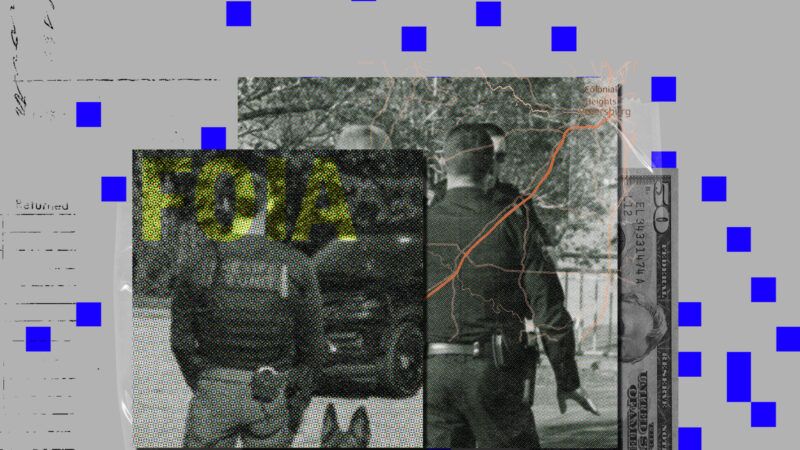South Carolina Cops Target Out-of-State Drivers for Highway Robbery
No arrest necessary as South Carolina police hunt for cash

This is part two of Operation Shakedown, a series about heavy-handed traffic enforcement tactics and property seizures in Spartanburg County, South Carolina. Click here to read part three.
To the untrained eye, there was nothing unusual on October 5, 2022, near mile marker 77 on Interstate 85. But when two deputies from Greenville County, South Carolina, saw a blue Tesla come into view, they sprang into action.
The vehicle was not speeding or driving recklessly. It had no broken lights or expired tags, nor had the car been reported stolen. What it did have was out-of-state plates on a rental car.
This is enough to trigger a traffic stop during Operation Rolling Thunder, the annual five-day law enforcement blitz that turns a 20-mile stretch of freeway between Charlotte, North Carolina, and Atlanta, Georgia, into a gauntlet for travelers.
No Drugs, No Problem
Finding a pretext for pulling a driver over is easy. "If us officers stay behind you long enough, we can find a reason to pull you over," a Washington state officer explains in a viral video that got her suspended. The excuse to stop the Tesla in South Carolina was "driving in the left lane while not actively passing."
The next goal, after stopping the Tesla driver, was to articulate probable cause to search it. This requires more than a traffic violation. Officers need a reasonable belief that a crime has occurred, so they claimed they could smell marijuana through the vehicle's open window.
Once inside the car, they found no marijuana or narcotics of any type, nor did they find stolen merchandise, fake IDs, weapons, or anything else illegal. All the deputies found was an unspecified amount of cash, which is not a crime to carry.
The driver and her passenger tried to explain, saying they were moving to Atlanta to start a hair business, and they would later fly back to Charlotte to pick up a car in the shop. If the deputies doubted this story, they could have continued investigating. But law enforcement agencies that want to keep cash do not need proof of wrongdoing.
Highway Robbery
A maneuver called civil forfeiture allows the government to take and permanently keep any property it seizes—no arrest or conviction necessary.
Agencies don't even have to identify a suspect. They are supposed to link seized property to criminal activity, but most of the time, they don't even have to prove anything by any standard in court.
Unlike criminal cases, civil forfeiture requires property owners to pay for their own attorney, which many cannot afford. Most cannot navigate the system by themselves either. Because of these hurdles, people frequently cut their losses and walk away, allowing the government to win. This is the case 98.6 percent of the time at the U.S. Department of Homeland Security, which waits on standby to take possession of cash seized during Operation Rolling Thunder.
Even if property owners make it to trial, they still face long odds. It's their word against that of law enforcement officers, who typically testify that property owners fit the drug courier profile for boilerplate reasons such as carrying cash in envelopes or vacuum-seal pouches.
Almost anything can justify civil forfeiture. One Florence County deputy cited rubber bands as suspicious during a bus search in October 2022. Another officer faulted a driver for simultaneously talking too much and not enough. "While being vague about his trip, [the driver] would overexplain other things," the officer wrote.
Lighting a cigarette during one stop was considered suspicious. So, too, was smelling like cologne, avoiding eye contact, being "preoccupied looking for the rental agreement," and having a cluttered vehicle that appeared to be "lived in."
Participating agencies can keep up to 100 percent of the proceeds seized through civil forfeiture. If the federal government gets involved, through a process called "equitable sharing," their cut is typically at least 20 percent.
The Tesla travelers did not even receive a traffic citation but still lost her property. The travelers were free to go after Homeland Security arrived, but not with their money.
See Something, Seize Something
This incentive to police for profit is huge. Participants from 11 agencies grabbed $968,611 during Operation Rolling Thunder in 2022. This comes to $194,000 per day or more than $8,000 per hour. This is the pattern during Operation Rolling Thunder.
Officers took four bundles of currency from one driver after searching his vehicle and finding nothing but THC vape pens. The police let him go without charges after he signed a roadside abandonment form, relinquishing his claim to the money, which he said came from gambling.
In two other cases, officers found cash on buses and seized the currency without arresting anyone. The police claim to be fighting the War on Drugs, but they grab cash wherever they can find it without any investigation into possible drug crimes.
When the clock is ticking, the police policy is simple: If you see something, seize something.


Show Comments (43)